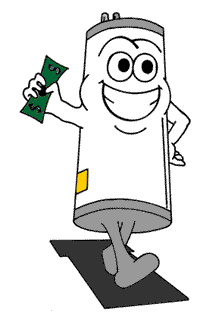Water Heating

Did you know that for most homes water heating is the third largest energy
expense, accounting for about 15 percent of the monthly electric bill? And if
your water heater is more than ten years old, it probably has an efficiency
rating no higher than 50 percent. To make matters worse, an old water heater can
operate for years at reduced efficiency before it finally fails.
If you are like most homeowners, you will wait until your water heater dies
before shopping for a replacement. But you can save yourself a lot of money over
time if you do some research first. These tips will help.
Water Heater Efficiency
A water heater's efficiency is measured by
its energy factor (EF). EF is based on recovery efficiency, standby losses and
cycling losses. The higher the EF, the more efficient the water heater. We
recommend a EF rating of .93 for water heaters under 60 gallons and .91 for
water heaters 60 to 120 gallons.
To make the most of the unit's efficiency, do not install it in an unheated
space. Also, try to minimize the piping to your bathroom and kitchen.
Sizing Your Water Heater
Although some consumers buy water heaters
based on the size of the storage tank, the peak-hour demand capacity, or the
first-hour rating (FHR), provided on the energy guide label is actually more
important. The FHR is a measure of how much hot water the heater will deliver
during a busy hour. Before you buy a water heater, estimate your household's
peak-hour hot water demand and look for a unit with an FHR in that range.
Types of Water Heaters
Within the last few years, a variety of
water heaters have become available, including conventional storage models, heat
pump, tankless (also known as point-of-use), indirect and solar. It is also
possible to purchase water heaters that can be connected to your home's
space-heating system.
Storage Water Heaters. These heaters remain the most popular for
residential heating needs. A storage heater operates by releasing hot water from
the top of the tank when the hot water tap is turned on. To replace that hot
water, cold water enters the bottom of the tank, ensuring that the tank is
always full. Because the water is constantly heated in the tank, energy can be
wasted even when no faucet is on. This is called standby heat loss. Newer, more
energy-efficient storage models can significantly reduce the amount of standby
heat loss, making them much cheaper to operate. To determine the most
energy-efficient model, consult the heater's energy guide. This shows the
estimated annual cost to operate the system and its energy efficiency rating.
Heat Pump Water Heaters. These water heaters move heat from one place
to another, instead of generating it directly. To heat water for homes, heat
pump water heaters work like refrigerators in reverse. Heat pump water heaters
are more efficient than conventional electric water heaters. Though a heat pump
water heater may have a high initial cost, it can save up to 50 percent on your
water heating bill.
Tankless Water Heaters. Tankless units are small heaters that provide
hot water on demand. They are installed near demand points, such as under
kitchen sinks. A tankless heater typically provides one to two gallons of water
per minute. Before installing a tankless water heater in your home, make sure
its reduced capacity will be adequate for your needs.
Solar Water Heaters. A solar water heater typically incorporates pumps
and controls to move heat-transfer fluids from collectors to a storage tank.
Often they have conventional water heaters as backup, or the solar system
functions as a pre-heater for the conventional unit. Solar water heaters can
reduce the annual fuel cost of supplying hot water to your home by more than
half. During the summer, they may provide all the required heat.
Comparing Costs
When choosing a water heater it is wise to analyze
the life cycle cost -- the total of all the costs and benefits during the
appliance's estimated lifetime. Units with longer warranties usually have higher
price tags. The least expensive water heater to purchase is generally the most
expensive to operate. Be sure to look at the annual cost to operate the unit,
found on the energy guide label.
To learn more about water heaters, contact Anita, Klickitat PUD's Energy Services
Specialist. You can call her at 509-773-7622, or toll-free at 800-548-8357.